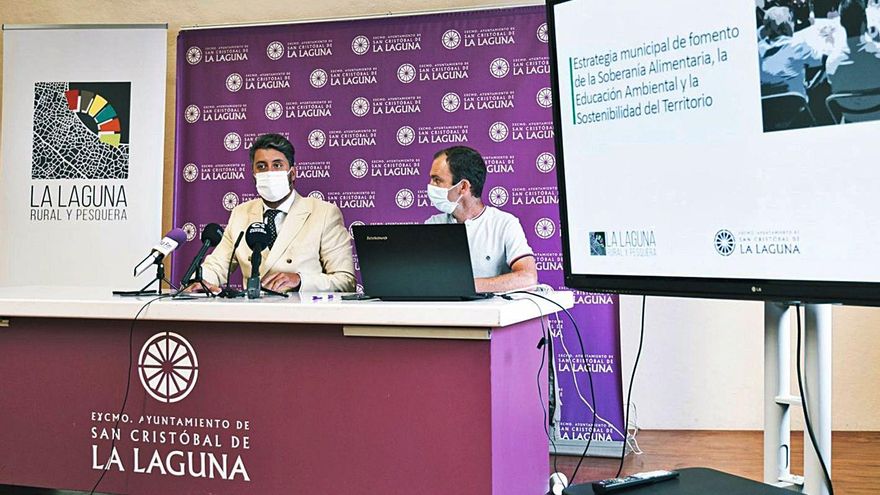
As specified by Rural Development, it so happens that the municipality has the largest agricultural system on the island, with 3,181 hectares. The latest data available, from 2016, specifically shows that 41.1% of the arable area was unused. Of the 1,308 hectares that are not planted, 23% represent a recent abandonment (306 hectares), while 74% are longer (973).
The empowerment of the field is precisely one of the consequences pursued with the plan presented this Friday, since its ultimate objective is the implementation of a strategy based on the principles of food sovereignty, which proposes a different model of produce, sell and consume food. The extensive document, which can be consulted on the municipal website www.lalaguna.es, was explained by the mayor of La Laguna, Luis Yeray Gutierrez, and the head of Rural, Agrarian, Livestock and Fisheries Development, Aitor López.
«From the first moment in which we assume the responsibilities of government in the city Hall, our priorities in terms of rural development have been to guarantee the protection of our agricultural land, support the activity of local producers by promoting local consumption and, ultimately, move towards an agri-food system that respects the environment and encourages healthy habits consumption, “said Gutiérrez. «This document is intended to be a starting point. It is an open and dynamic project, since the transition process of the municipal agri-food system requires constant updating, “he added.
The text prepared, which includes a proposal for an action plan, is the result «of a participatory process developed during the years 2020 and 2021», Picks up the note from the City Council. “The Strategy indicates that the implementation of an increasingly industrial food system is having detrimental effects on the health of the population, at the same time that it makes the Canary Islands excessively dependent on the outside for food,” they reported from the Lagunero Consistory, and added : “This entails the gradual deterioration of the primary sector and of the agrarian and maritime territories, but also of the living conditions themselves.”
For his part, Aitor López pointed out that this strategy is “the framework document that will guide us in the future of the City Council’s agricultural, livestock and fishing policy.” Likewise, the head of Rural Development indicated that there have been meetings “with all sectors of society that have something to say about the agri-food system to develop a guide towards a more sustainable, inclusive and resilient agriculture, where the main strategic line is the promotion of agroecology as a local, healthy and nutritious food production system ”.
The aforementioned action plan is articulated around four axes: municipal food governance (which addresses the creation of participatory instruments for local coordination and management in the agri-food field), sustainable production, marketing and agro-ecological distribution, and conscious food consumption and responsible.
















